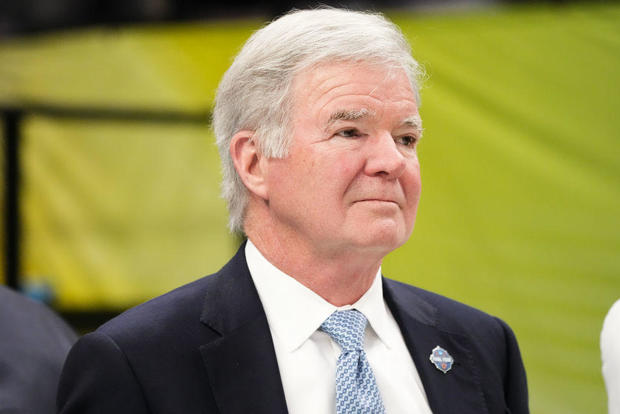Mark Emmert, who served as NCAA president for 12 years, is stepping down, the association announced Tuesday. Emmert will remain as president until his replacement is found or until June 30, 2023, the NCAA said in a statement.
“Throughout my tenure, I have emphasized the need to focus on the student-athlete experience and priorities,” Emmert said in a statement. “I am extremely proud of the Association’s work over the past 12 years and especially pleased with the hard work and dedication of the national office staff here in Indianapolis.”
The decision to resign from Emmert, 69, was mutual between him and the NCAA Board of Governors, according to the statement. The move comes as the landscape of college sports changes and student-athletes have access to lucrative economic opportunities previously prohibited by NCAA rules.
“With significant transitions underway within varsity sports, the timing of this decision provides the Association with continued leadership over the coming months, as well as an opportunity to consider what the future role of the president will be,” said the president of the NCAA Board of Governors, John J. DeGioia. saying. “It also allows for the selection and hiring of the next president without interruption.”
The move is not entirely a surprise. The NCAA remains the largest governing body in collegiate athletics, but it has come under heavy criticism for years for being too harsh and even outdated, with Emmert as its primary target.
Ethan Mito/NCAA Photos via Getty Images
Emmert has guided the NCAA through the most transformative period in the organization’s more than 100-year history. Over the last decade, athletes have gained more power, benefits, and ability to earn money than ever before. Amateurism has been redefined.
But Emmert has been seen by some not as a catalyst for change but as an obstacle standing in the way, or at least reactive rather than proactive.
The announcement comes a year after the board approved a contract extension for Emmert that would run through 2025, a move that left many in college sports baffled. Emmert’s annual salary was nearly $3 million.
The NCAA has suffered a series of damaging court losses that peaked with last year 9-0 Supreme Court ruling against the association in an antitrust case. The decision undermined the NCAA’s ability to govern college sports and prompted a total overhaul of its operations.
Years after losing an antitrust case over the NCAA’s use of athletes’ names, likenesses and likenesses, the association finally changed its rules last June to allow athletes to profit as sponsors and paid sponsors. The move came only after state lawmakers passed legislation to neutralize the NCAA’s power, and since Congress was unwilling to provide federal protection, the NCAA has been unable to regulate NIL activity with uniform rules, which generated new criticism.
Emmert was appointed to the position in April 2010. He had led the University of Washington and LSU before taking the role in Indianapolis.
NCAA revenue has reached more than $1 billion per year under Emmert, primarily through television deals for the men’s college basketball tournament, with most of the money redistributed to more than 1,100 member schools with nearly 500 000 athletes.
Still, the disparity between what the wealthiest schools put in compared to what the vast majority of schools spend on athletics has made it difficult for them all to coexist under one umbrella organization.
NCAA member schools adopted a new constitution in January and are in the process of “transforming structure and mission to meet future needs.”

